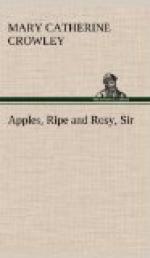“Why didn’t she get a new one?” inquired Eugenia Dillon, a girl of a haughty disposition, who attached a great deal of importance to costly clothes.
“Hadn’t any money,” responded Lillie, nibbling at a delicious pickled lime which she had produced from a corner of her lunch basket.
“Then I’d wait till I had—”
“Oh, not put off your First Communion!” protested one of the group.
“Why, yes,” returned Eugenia, conscious that she had scandalized them a little and trying to excuse herself. “It is not respectful or proper not to be fitly dressed for such a great occasion.”
“But Annie was as neat as could be,” said Constance; “and looked as pretty as a picture, too. I’m sure Our Lord was as pleased with her as if she were dressed like a princess, because she is such a good little thing.”
“Come, Connie, don’t preach!” objected Eugenia, impatiently. “Besides, how could she have looked pretty in a mended dress? I wish you could see the one I’m going to have! It’s to be of white silk,—the best that can be got at Brown’s.”
“It won’t be any more beautiful than mine. I’m to have tulle,” said Lillie.
“And I—” continued Constance.
“Mine is to be trimmed with point-lace,” broke in another.
“And I’m to wear mamma’s diamonds,” boasted somebody else.
“You can’t,” demurred a quiet girl, who had not spoken before. “Sister Agnes said that we are not to be allowed to wear jewelry or silk either; and that, though the material for the dresses may be of as fine a quality as we choose, they ought not be showy or elaborate.”
“That is all very well to say,” answered Eugenia. “The nuns can enforce these rules in their boarding-schools, but hardly in a day-school like this. We’ll wear what we please, or what our mothers select. Mamma has decided to get the white silk for me, because so many of our friends will be present, and she wants my dress to be the handsomest of any.”
This information was received without comment, but it aroused in some foolish little hearts a feeling of envy, and in others a desire of emulation.
Eugenia Dillon was the richest girl in the school. Her father, a plain, sensible man, who had lacked early advantages, had within a few years amassed a considerable fortune, which he would gladly have enjoyed in an unostentatious, unpretending manner. This, however, did not suit his wife at all. Mrs. Dillon, though a kind-hearted, charitable woman, was excessively fond of style, lavishly extravagant, and inclined to parade her wealth upon all occasions. She did not realize that the very efforts she made to attain the position in society which would have come to her naturally if she had but the patience to wait, caused her to be sneered at as a parvenu by those whose acquaintance she most desired. Unconscious of all this, she pursued her way in serene self-satisfaction,—a complacency shared by Eugenia, who delighted in the good fortune and bad taste which permitted her to wear dresses of silk or velvet to school every day in the week, and caused her to be as much admired as a little figure in a fashion-plate by those of her companions who were too unsophisticated to know that vain display is a mark of vulgarity.




